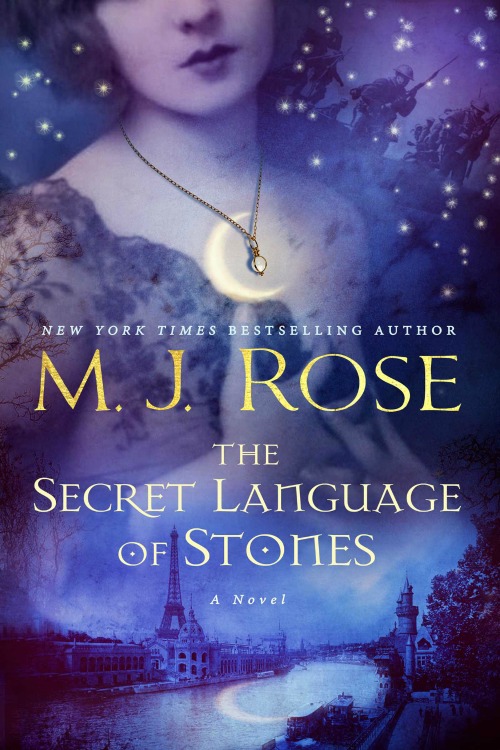
Exclusive Excerpt: The Secret Language of Stones by M.J. Rose

With a spellbinding mix of history, mystery and romance, bestselling author M.J. Rose delivers the second installment in The Daughters of La Lune series—The Secret Language of Stones. I’m thrilled to give you a sneak peek at this novel, which can be read as a standalone and is out tomorrow!
✦ Order Now: Amazon | iBooks | Barnes & Noble ✦
Synopsis
As World War I rages and the Romanov dynasty reaches its sudden, brutal end, a young jewelry maker discovers love, passion, and her own healing powers in this rich and romantic ghost story, the perfect follow-up to M.J. Rose’s “brilliantly crafted” (Providence Journal) novel The Witch of Painted Sorrows.
Nestled within Paris’s historic Palais Royal is a jewelry store unlike any other. La Fantasie Russie is owned by Pavel Orloff, protégé to the famous Faberge, and is known by the city’s fashion elite as the place to find the rarest of gemstones and the most unique designs. But war has transformed Paris from a city of style and romance to a place of fear and mourning. In the summer of 1918, places where lovers used to walk, widows now wander alone.
So it is from La Fantasie Russie’s workshop that young, ambitious Opaline Duplessi now spends her time making trench watches for soldiers at the front, as well as mourning jewelry for the mothers, wives, and lovers of those who have fallen. People say that Opaline’s creations are magical. But magic is a word Opaline would rather not use. The concept is too closely associated with her mother Sandrine, who practices the dark arts passed down from their ancestor La Lune, one of sixteenth century Paris’s most famous courtesans.
But Opaline does have a rare gift even she can’t deny, a form of lithomancy that allows her to translate the energy emanating from stones. Certain gemstones, combined with a personal item, such as a lock of hair, enable her to receive messages from beyond the grave. In her mind, she is no mystic, but merely a messenger, giving voice to soldiers who died before they were able to properly express themselves to loved ones. Until one day, one of these fallen soldiers communicates a message—directly to her.
So begins a dangerous journey that will take Opaline into the darkest corners of wartime Paris and across the English Channel, where the exiled Romanov dowager empress is waiting to discover the fate of her family.
Excerpt
Outside I found quiet. No sirens, few cars. The streets of Paris were eerily unwelcoming, but at least everything existed in three dimensions. Walking on cobblestones, looking above me at the stars, I focused on the facts of the world around me, not the fantasies I kept crafting in my little room. The buildings loomed large in the moonlight; footsteps of one other late-night pedestrian echoed in the still night. Glancing over I saw a lasciviously dressed woman hurrying in the opposite direction. Crossing rue Royale, I walked under the archway and into the Louvre’s courtyard and kept going until I reached the quai du Louvre. I descended the wide stone steps down to the path running along the river, the quai des Tuileries, and made my way as close as I could get to the water.
But this was nothing like walking by the sea in Cannes. I missed the scent of salt, the sound of the waves crashing, the give of the sand underfoot. Instead, the swiftly flowing river smelled cold and slightly metallic; the stones underfoot were uneven and unforgiving. Only the moon was the same. At that very moment, the same moon was shining down on the beach at home. And the soldiers in the field. And the tombstones in the cemetery.
The path appeared empty. I was alone. With no destination in mind, I just kept moving forward, hoping I might walk into proof that my mind wasn’t infected. Or even proof that it was. I just wanted an answer.
If I could just know I wasn’t insane, I could live with the discomfort. I could withstand the bittersweet romance with a lover whom I knew I would lose one day. I could tolerate the noise. But this lack of proof? This uncertainty? That’s what I couldn’t endure anymore. Were the voices in my head or in some other place? Was I making up Jean Luc, or was he a trapped soul communicating with me?
And if Jean Luc was real—if any ghost could be real—then this love affair was doomed, wasn’t it?
I’d reached the oldest bridge in Paris, the Pont Neuf, and stood underneath it. Water swirled in eddies around the bridge’s piles. So many had walked across its span since it had been built in the sixteenth century. How many times had my ancestor, the original La Lune, traversed it? Had she stood here and stared down at the water, missing her lover, wondering how she could live with the mistakes she’d made in trying to recapture what she’d lost, what she’d destroyed? Had she ever stood here and wondered if the river would welcome her and offer her the release she so badly wanted . . . freedom from longing, from loneliness?
Despondent, I climbed the stairs to the street level. I meant to turn away, not to walk out onto the bridge. But I did. I walked halfway out, stood at the railing, and stared down.
Reading Order
a Rafflecopter giveaway
Follow M.J.
✦ ✦ ✦ ✦ ✦ ✦ ✦ ✦

Facebook | Twitter | Pinterest | Instagram | Goodreads | Subscribe by Email
Follow me on Snachat: vilmasbookblog
Subscribe for Updates:












 by
by